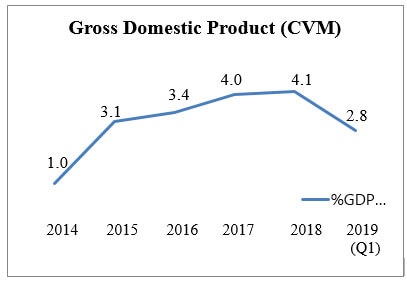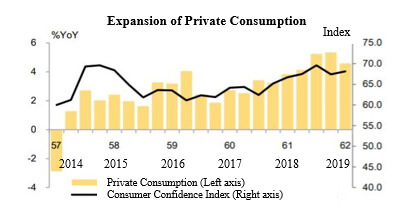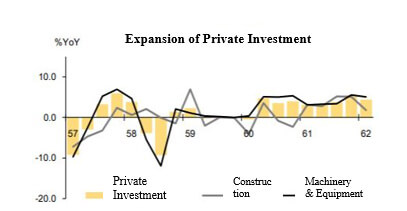Thailand’s Confidence in Economy Up, With the New Government in Place

Source: Adapted from Gross Domestic Product (GDP) data by the Office of the National Economics and Social Development Council https://www.nesdb.go.th/ewt_dl_link.php?nid=8882
According to the Office of the National Economics and Social Development Council (NESDC), Thailand’s economy grew slightly in the past five years. The GDP growth from 2014 to 2018 slowed down to between 1.0% - 1.4%, as per the NESDC. The GDP growth in 2019 is about 3.3% - 3.8%, of which was only 2.8% in the first quarter. This is the result of a deceleration of export affected by global economic slowdown, the US-China trade war, surging Thai Baht, and unstable political situation in Thailand, which is another important risk factor related to Thailand’s economic growth. It has significant impacts on and causes less reliability from Thai and foreign investors. Therefore, this is a challenge that the newly elected government in 2019 has to deal with in order to maintain stability and to stimulate Thailand’s economic growth, bringing about a well being for the people in this country.
|
2019 Economic Forecast |
||||||
|
(% YoY) |
2017 |
2018 |
2019 |
|||
|
FY |
FY |
Q3 |
Q4 |
Q1 |
FY |
|
|
GDP (CVM)
Private Consumption
Import Value2/
Current Account to GDP (%) |
4.0 |
4.1 |
3.2 |
3.6 |
2.8 |
3.3-3.8 |
Source: Excerpt from the Office of the National Economics and Social Development Council (NESDC) on Thailand’s Economic Situation in Q1 of 2019 and Forecast for 2019 FY https://www.nesdb.go.th/ewt_dl_link.php?nid=8886
Recently there was a report in early July 2019 mentioning that the World Bank has adjusted Thailand’s economic growth rate for the whole year of 2019 from 3.8% to 3.5% due to a global economic slowdown that affects and decreases product and service export from Thailand. Additionally, the 2019 export value forecast, which was expected to grow over 5%, was adjusted down to 2.2%.People have confidence in Thailand’s economy after a new government is in place
In the first quarter of 2019, other economic indicators (namely other GDP components) determined low growth rates. These rates, including total investment and export, were lower than those of the previous years. However, private investment and consumption seem to increase highly. Private sector and civil society are confident that Thailand’s economy is well stable due to the new government formed in March 2019, the economic stimulation measures enacted by the previous government before election, and their progress of basic infrastructure investment policies.

Source: Private Consumption. Thailand’s Economic Situation in Q1 of 2019 and Forecast for 2019 FY. NESDC https://www.nesdb.go.th/ewt_dl_link.php?nid=8886
From this figure, the private consumption is as high as 4.6%, compared with 5.4% of the previous quarter, as a result of employment expansion, income-based government assistance programs for low-income people, along with an increase in consumer confidence. The Consumer Confidence Index towards Thailand’s economy increased from 67.4 in Q4 of 2018 to 68.1. (Data retrieved from NESDC)
Source: Private Investment. Thailand’s Economic Situation in Q1 of 2019 and Forecast for 2019 FY. NESDC https://www.nesdb.go.th/ewt_dl_link.php?nid=8886
Private investment is expanding well at 4.4%, compared with 5.5% in the previous quarter. This is mainly resulted from investments in machinery and domestic constructions such as import of cars, distribution of ready mixed concrete and concrete piling, distribution of metal goods, and distribution of tiles. The Business Sentiment Index is slightly decreasing from 50.7 in Q4 of 2018 to 50.4. (Data retrieved from NESDC) After the new government is officially formed, it is expected that the government will issue short-term economic stimulation measures to support economic growth. Moreover, the government should be able to implement and continue to enact basic infrastructure development investment policies, including the transportation and logistics systems, and the Eastern Economic Corridor (EEC) development plan. These will benefit Thailand’s economy and boost confidence among foreign investors, increasing investment in stock and bond markets, as well as foreign direct investments (FDI), in order to expand manufacturing bases and increase basic infrastructure investment in the country. As can be seen, after an election was announced and a new government was formed, confidence in Thailand’s political and economic stability has been increasing. What is significant afterwards is how the government will enact their economic policies, disburse the remaining 2019 budget, and urgently finish planning the 2020 budget process before the next fiscal year begins in October 2019. Increasing confidence among civil society, private sector, and exporters can uplift economic growth for the better.Economic challenges for the new government
- 1. Promote export and tourism that directly affect the growth of Thailand’s economy. This includes promoting goods benefited from trade barriers between Chinese and US markets, expanding trade collaboration between countries in the region, as well as promoting and positive image building for tourism in Thailand in terms of safety and uniqueness of Thai culture to attract more Thai and foreign tourists.
- 2. Implement spending and investment policies for basic infrastructure projects by focusing on and urgently finish planning the 2020 budget process to avoid the delay in mega projects related to basic infrastructures, which are crucial in increasing potentials for economic development.
- 3.Promote an expansion of private investment following the Eastern Economic Corridor (EEC) development policies, development of 5G technology, and relocation of manufacturing bases from another country to Thailand due to trade barriers between China and the US.
- 4. Attract foreign investment by creating understanding among foreign investors about economic policies and significant government investment projects in order to boost confidence, to attract foreign investment in stock and bond markets, and to expand manufacturing bases in Thailand as a result from the US-China trade barriers.
- 5. Address a price problem of agricultural products, expand market, promote standards for product quality improvement, implement land and water resources management measures, etc. to solve farmers’ debt and income inequality.
- 6. Lastly, another challenge for the government is to earn more money in order to sufficiently cover its spending and maintain the government stability for continuous implementation of those policies. These include tax collection, government bond issuance, and loan schemes. Tax structure must be determined properly and it should not deepen an income inequality problem. Moreover, a government stability concern is another significant challenge that may affect the continuity and implementation of governmental policies. The current government administration must boost confidence among civil society, as well as Thai and foreign investors, to gradually drive Thailand’s economic growth.
Sources :
https://www.nesdb.go.th/ewt_dl_link.php?nid=8886
https://www.nesdb.go.th/ewt_dl_link.php?nid=8882
https://www.matichon.co.th/columnists/news_1577409
https://www.matichon.co.th/news-monitor/news_1572080
https://www.matichon.co.th/news-monitor/news_1574206
https://siamrath.co.th/n/89390



 BACK
BACK